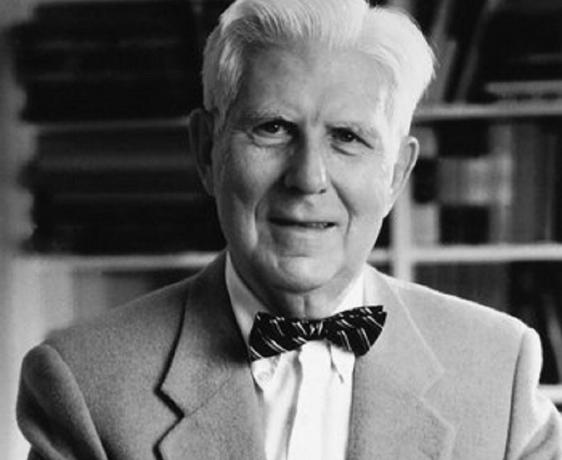Aaron Beck: Biography of the Creator of Cognitive Behavioral Therapy
On Monday, November 1, one of the most important figures for clinical psychology passed away: Aaron Temkin Beck. This North American psychiatrist is credited with being the inventor of cognitive therapy and cognitive-behavioral therapy, being his fundamental scientific findings for the therapeutic approach to depression.
The figure of Beck is widely known in all faculties of psychology, especially his cognitive therapy and his inventories for depression and anxiety, psychometric tests widely used in the objective evaluation of these disorders.
As a tribute and to honor his figure, we are going to talk about the life of this researcher through a biography of Aaron T. Beck in summary format.
- Related article: "Cognitive-Behavioral Therapy: what is it and on what principles is it based?"
Short Biography of Aaron T. Beck
Aaron Temkin Beck has been and continues to be one of the most influential psychiatrists in the history of psychology and psychiatry. His last name gives name to one of the best known therapies in the world of Clinical Psychology, Beck's cognitive therapy, treatment that incorporates specific approaches to information processing while taking into account the behavior of the patient.
Early years
Aaron Temkin Beck was born in Providence, Rhode Island (United States) on July 18, 1921, in a family of Russian Jewish immigrants, he being the youngest of the three surviving children.
Beck's childhood was marked by an overprotective mother, who lost one of her daughters, an event that plunged her into a deep depression and that she, obsessed with the fear of losing another son, she made him be on top of young Aaron practically all the time. Beck himself would confess years later that he felt like a kind of replacement for his sister, and that he felt his mother was disappointed that he was not a girl.
At the age of seven Beck broke his arm when he was playing at recess. The broken bone became infected and progressed to generalized septicemia (infection of the blood), which forced him to stay in the hospital for a long time. Because of this, little Aaron missed out on going to second grade. Beck would later admit that at this time he felt "stupid", believing that he was not smart enough.
Beck missed his friends and didn't like being on a course behind them at all. To fix it, he asked his older brothers to tutor him and, along with his eagerness and determination, little Aaron He was not only able to go back to study with his friends but also ended up taking a course above what was expected for his age.
- You may be interested in: "History of Psychology: main authors and theories"
University education
Young Aaron discovered that he was smarter than he believed, marking a psychological turning point. in his life and that would be demonstrated a few years later when it was time to enter the University.
Beck managed to graduate at the head of his class from Hope High School and in the fall of 1938 he was able to enter the prestigious Brown University.. He would graduate cum laude in 1942 and later from Yale School of Medicine in 1946
Aaron T. Beck developed various phobias throughout his childhood. One of them was blood and wounds, which he himself attributed to his unpleasant experience with surgery after breaking his arm as a child. His experience of his event was very traumatic as, according to him, the surgeon began to make the incision before the anesthesia took effect.
its blood phobia it was an impediment in his training as a doctor. During his training for this profession, Beck had to fight the anxiety and dizziness he felt while helping with operations. Surprisingly, he managed to overcome his blood phobia by gradually exposing himself to the instruments and sounds of the operating room, and keeping busy while he helped with the surgery.
Beck also suffered from a phobia of fear of suffocation, apparently caused by a severe case of whooping cough, chronic childhood asthma and an older brother who used to play the "joke" on him of putting a pillow on his face.
In addition, he presented a phobia of tunnels, feeling tightness in his chest and breathing difficulties while he was driving through one of them. It is known that he developed a fear of heights and public speaking.

Despite his many phobias, Beck managed to overcome them using the same approach from which his well-known therapy would be formed: Beck's cognitive therapy. He himself maintained that he was able to overcome these fears by working on them cognitively.
Aaron T. Beck too was based on his own experiences when writing his first book on depressive disorders, published in 1967 and called "The diagnosis and management of depression.". At the time, Beck was slightly depressed, but he himself regarded the writing of the book as a kind of self-treatment.
As time went by, Aaron T. Beck decided to specialize in neurology as he was attracted to the degree of precision required of practitioners of this specialty. While he was completing the required rotation in psychiatry he became interested in some of the discoveries recent years in the treatment of mental disorders, which is why he decided to become a psychotherapist.
- Related article: "Beck's Cognitive Triad: What Is This Theoretical Model On Depression?"
Personal life
In 1950 Aaron T. Beck married Phyllis W. Beck with whom he would have four children: Roy, Judith (Judy), Dan and Alice, who would give him eight grandchildren.
Among his descendants the most notorious is his daughter Judith S. Beck, influential cognitive-behavioral therapist and current president of the Beck Institute, an institution that promotes cognitive-behavioral treatments. Father and daughter founded the institute together in 1994, an institution of which Aaron T. Beck has been its president emeritus.
Last years and death
At the time of his passing, Aaron T. Beck was Professor Emeritus of Psychiatry at the University of Pennsylvania. He died on November 1, 2021 at his home in Philadelphia, Pennsylvania, at the age of 100.
- You may be interested in: "Aaron Beck's Cognitive Therapy"
Beck and the cognitive approach in treating depression
From the beginning, Aaron T. Beck was studying psychiatry. However, during his psychiatric training he became interested in the psychoanalytic approach and his particular way of understanding psychological disorders. Thus, he spent the early part of his career studying and researching psychoanalysis, specifically the way he treated depression.
However, after several years of acquiring knowledge and practice in psychoanalytic therapy, Aaron T. Beck realized that this approach lacked scientific rigor, nor did it have the framework or empirical evidence that he desired. As a result of this he changed his interest towards the cognitive approach and his research in depression intensified after carrying out a work in the department of psychiatry at the University of Pennsylvania, where he would establish a clinic specializing in this disorder.
Aaron T. Beck he noticed that his patients with depression frequently expressed spontaneous negative thoughts about themselves and their surroundings. When these thoughts appeared in their minds, patients saw them as valid and realistic, and it was difficult for them to question them on their own. For this reason, Beck focused on helping patients identify these automatic negative thoughts and help them replace them with more objective thoughts.
Aaron T. Beck found that, to achieve successful treatment for any psychological problem, it was necessary to make patients aware of their negative thought patterns. This approach to treatment was what would eventually be called cognitive-behavioral therapy.
In his first cognitive model for depression, Beck incorporated three specific concepts:
- The cognitive triad
- Stable patterns of thinking
- Cognitive errors or faulty information processing
According to the author, the cognitive triad encompasses a depressed person's view of themselves, their ongoing experiences, and their future, which makes her consider experiences or interactions with others as defeats or failures, or even think that way about herself. The patient sees the future as one full of difficulties, frustration, and deprivation. Thus, in this triad we can identify the following aspects:
- Negative view of yourself
- Negative view of the world
- Negative view of the future
In Beck's view, this triad of negative cognitive patterns causes emotional disturbances and loss of energy and motivation characteristic of clinical depression. Based on this, this psychiatrist designed a type of therapy aimed at identifying these distortions of thinking in patients.
Aaron T. Beck also designed tests to measure whether or not his new therapy worked. For this reason we can find some psychological tests that bear his surname, being the most used the Beck Depression Inventory (BDI) and the Beck Anxiety Inventory. These tests are reliable, standardized and objective ways to measure depression and anxiety, tests which helped Beck show that his therapy worked.
Thanks to his cognitive theory of depression and the tools he put together to evaluate it, Beck has been instrumental in changing the world of psychotherapy forever.
The importance of this researcher for Psychology
Beck's cognitive therapy is one of the most powerful therapeutic methods available, being extensively tested in more than 400 clinical trials. This treatment has been shown to be effective for a wide variety of disorders. such as depression, anxiety, panic disorder, substance abuse, and personality disorders.
Beck has the honor of being the only psychiatrist who has published articles in the two APAs, both in the journal of the Association American Psychiatric Association and the American Psychological Association Association). His contributions to behavioral science and the treatment of mental disorders are so great caliber that the American Psychologist Journal named him one of its five most influential psychologists of all time. More than 600 articles and 25 books are authored by Aaron T. Beck.
This psychologist he was named one of the most influential people in mental health, and one of the ten most influential people in American psychiatry. His cognitive-behavioral therapy is so important worldwide that it is taught as a therapeutic technique in practically every psychology school in the world. Beck has received numerous honors for his work, including five honorary degrees, the Institute's Lienhard Prize National of American Medicine for his development of cognitive therapy, in addition to obtaining the Kennedy Prize in health community.
His work at the University of Pennsylvania was inspirational to the American psychologist and writer Martin Seligman, who, thanks to Beck's work, refined his own cognitive techniques that would serve him to work on learned helplessness.

